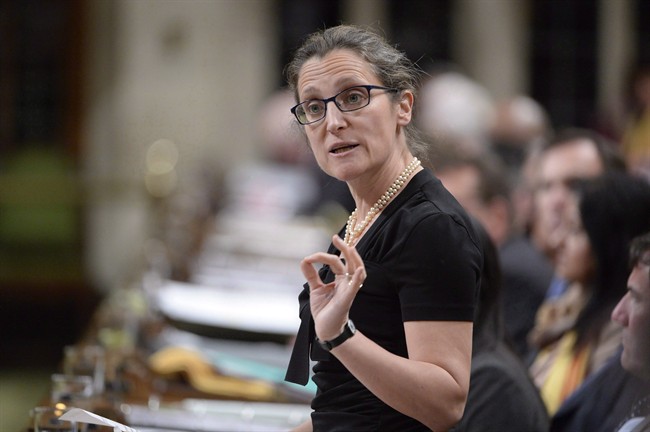The Canadian government will back imposing sanctions on officials from Russia and other nations deemed guilty of human-rights violations, Foreign Minister Chrystia Freeland announced Wednesday.

Freeland told Parliament that Canada’s Liberal government supported draft legislation to expand the range of available punitive measures against foreign officials. The bill is inspired by the case of Russian whistleblower Sergei Magnitsky, an anti-corruption lawyer who died in 2009 after a year in a Russian jail. Magnitsky was imprisoned after accusing officials of a $230-million tax fraud.
WATCH: White House responds to Duterte’s human rights record

“In Canada and around the world, the issue of human-rights sanctions and in particular the case of Sergei Magnitsky have drawn strong interest, and rightly so,” said Freeland in a speech to the House on Wednesday night. “However, there no current Canadian law that authorizes the imposition of sanctions specifically for violations of international human-rights obligations in a foreign state or for acts of corruption,” Freeland said according to the Globe and Mail.
Freeland, who expressed specific support for Bill S-226, made the announcement one month after the House of Commons foreign affairs committee encouraged the Liberal government to broaden Canadian sanctions legislation to include human-rights abusers. The proposed Sergei Magnitsky Law would allow Ottawa to seize the assets and property of foreign officials. The bill, proposed by an opposition legislator, has widespread backing and is almost certain to become law.
- B.C. to adopt permanent daylight saving time, after springing forward one more time
- In London, Poilievre pitches new UK, Australia, New Zealand partnership
- Danielle Smith says Iran war underscores need for new Alberta pipeline to the coast
- No more federal budget watchdog in Ottawa as interim PBO’s term expires
Based on the Russian reaction to other nations that implemented legislation in response to this case, it’s likely that this law will further cool relations between Canada and Russia. The Obama administration enacted its Magnitsky Act in 2012, which prompted Russian President Vladimir Putin to respond with a law that banned American citizens from adopting Russian children.

Get breaking National news
Tension also exists between Ottawa and the Kremlin, which includes a Russian travel ban on Freeland, who was one of several Canadians placed on a Russian sanctions list in 2014 after Western sanctions were imposed on Russia following its annexation of Ukraine’s Crimea region. In Freeland’s previous career as a journalist, she had called Putin a “really dangerous” authoritarian.
Liberal, Conservative and New Democrat MPs on the Commons committee supported the change to the Special Economic Measures Act as part of a mandated review of that law and the Freezing Assets of Corrupt Foreign Officials Act.
WATCH: Report: ‘Toxic fear-mongering’ threatens human rights around the world

The committee decided to take a more in-depth look at the issues surrounding Magnitsky’s death after human-rights watchdogs reported that he was beaten in prison and denied medical treatment.
In a previous interview, the chair of the committee, Liberal MP Bob Nault, said that to have done otherwise would have amounted to the committee missing “a piece of reality.”
The committee also heard testimony from lawyer William Browder, whose firm Magnitsky had worked for, former Liberal MP and human-rights lawyer Irwin Cotler, Russian democracy advocate Garry Kasparov and other prominent voices on human rights. Kasparov told the committee the legislation was important because Russia was working so hard to oppose it.
“That’s why Putin and his cronies and his agents and his lobbyists were so aggressive in trying to repeal the Magnitsky Act. It is because it will hurt the very foundation of his so-called social contract with the Russian elite,” Kasparov said in December.
Russia has been frequently accused of human-rights violations in the past. Last March, officials announced that the U.N. human rights office in Moscow would close, and just a few months later Russia was voted out of the U.N. Human Rights Council.
— With files from Reuters and Canadian Press








Comments
Want to discuss? Please read our Commenting Policy first.